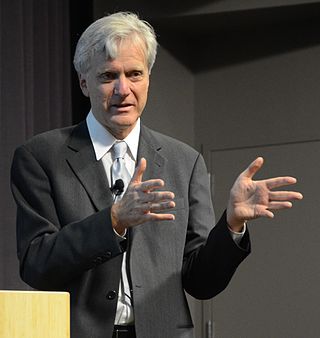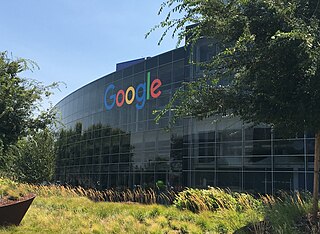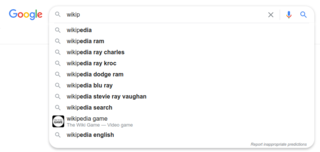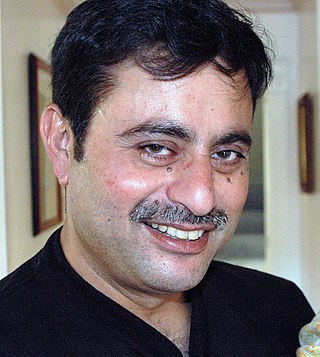Related Research Articles

A Web crawler, sometimes called a spider or spiderbot and often shortened to crawler, is an Internet bot that systematically browses the World Wide Web and that is typically operated by search engines for the purpose of Web indexing.

Lawrence Edward Page is an American businessman, computer scientist, and internet entrepreneur best known for co-founding Google with Sergey Brin.

Sergey Mikhailovich Brin is an American businessman best known for co-founding Google with Larry Page. Brin was the president of Google's parent company, Alphabet Inc., until stepping down from the role on December 3, 2019. He and Page remain at Alphabet as co-founders, controlling shareholders, and board members. As of March 2024, Brin is the 10th-richest person in the world, with an estimated net worth of $119 billion, according to the Bloomberg Billionaires Index and Forbes.
CiteSeerX is a public search engine and digital library for scientific and academic papers, primarily in the fields of computer and information science.

Andreas Maria Maximilian Freiherr von Mauchenheim genannt Bechtolsheim is a German electrical engineer, entrepreneur and investor. He co-founded Sun Microsystems in 1982 and was its chief hardware designer. As of March 2024, Forbes estimated his net worth at $16.3 billion.

Google LLC is an American multinational corporation and technology company focusing on online advertising, search engine technology, cloud computing, computer software, quantum computing, e-commerce, consumer electronics, and artificial intelligence (AI). It has been referred to as "the most powerful company in the world" and is one of the world's most valuable brands due to its market dominance, data collection, and technological advantages in the field of AI. Google's parent company, Alphabet Inc. is one of the five Big Tech companies, alongside Amazon, Apple, Meta, and Microsoft.
Clyde Lee Giles is an American computer scientist and the David Reese Professor at the Penn State College of Information Sciences and Technology (IST) at the Pennsylvania State University. He is also Graduate Faculty Professor of Computer Science and Engineering, Courtesy Professor of Supply Chain and Information Systems, and Director of the Intelligent Systems Research Laboratory. He was Interim Associate Dean of Research in the College of IST. He graduated from Oakhaven High School in Memphis, Tennessee. His graduate degrees are from the University of Michigan and the University of Arizona and his undergraduate degrees are from Rhodes College and the University of Tennessee. His PhD is in optical sciences with advisor Harrison H. Barrett. His academic genealogy includes two Nobel laureates, Arnold Sommerfeld and prominent mathematicians.

Lawrence Charles Paulson is an American computer scientist. He is a Professor of Computational Logic at the University of Cambridge Computer Laboratory and a Fellow of Clare College, Cambridge.

A search engine is a software system that provides hyperlinks to web pages and other relevant information on the Web in response to a user's query. The user inputs a query within a web browser or a mobile app, and the search results are often a list of hyperlinks, accompanied by textual summaries and images. Users also have the option of limiting the search to a specific type of results, such as images, videos, or news.
Google was officially launched in 1998 by Larry Page and Sergey Brin to market Google Search, which has become the most used web-based search engine. Larry Page and Sergey Brin, students at Stanford University in California, developed a search algorithm first (1996) known as "BackRub", with the help of Scott Hassan and Alan Steremberg. The search engine soon proved successful and the expanding company moved several times, finally settling at Mountain View in 2003. This marked a phase of rapid growth, with the company making its initial public offering in 2004 and quickly becoming one of the world's largest media companies. The company launched Google News in 2002, Gmail in 2004, Google Maps in 2005, Google Chrome in 2008, and the social network known as Google+ in 2011, in addition to many other products. In 2015, Google became the main subsidiary of the holding company Alphabet Inc.

Héctor García-Molina was a Mexican-American computer scientist and Professor in the Departments of Computer Science and Electrical Engineering at Stanford University. He was the advisor to Google co-founder Sergey Brin from 1993 to 1997 when Brin was a computer science student at Stanford.

Massimo Marchiori is an Italian mathematician and computer scientist.

Mark A. Horowitz is an American electrical engineer, computer scientist, inventor, and entrepreneur who is the Yahoo! Founders Professor in the School of Engineering and the Fortinet Founders Chair of the Department of Electrical Engineering at Stanford University. He holds a joint appointment in the Electrical Engineering and Computer Science departments and previously served as the Chair of the Electrical Engineering department from 2008 to 2012. He is a co-founder, the former chairman, and the former chief scientist of Rambus Inc.. Horowitz has authored over 700 published conference and research papers and is among the most highly-cited computer architects of all time. He is a prolific inventor and holds 374 patents as of 2023.

In computer science, a fingerprinting algorithm is a procedure that maps an arbitrarily large data item to a much shorter bit string, its fingerprint, that uniquely identifies the original data for all practical purposes just as human fingerprints uniquely identify people for practical purposes. This fingerprint may be used for data deduplication purposes. This is also referred to as file fingerprinting, data fingerprinting, or structured data fingerprinting.
Kaltix Corporation was a personalized search engine company founded at Stanford University in June 2003 by Sepandar Kamvar, Taher Haveliwala and Glen Jeh. It was acquired by Google on September 2003.

Rajeev Motwani was an Indian American professor of Computer Science at Stanford University whose research focused on theoretical computer science. He was a special advisor to Sequoia Capital. He was a winner of the Gödel Prize in 2001.

Operation Clambake, also referred to by its domain name, xenu.net, is a website and Norway-based non-profit organization, launched in 1996, founded by Andreas Heldal-Lund, that publishes criticism of the Church of Scientology. It is owned and maintained by Andreas Heldal-Lund, who stated that he supported the rights of all people to practice Scientology or any religion. Operation Clambake has referred to the Church of Scientology as "a vicious and dangerous cult that masquerades as a religion". The website includes texts of petitions, news articles, exposés, and primary source documents. The site has been ranked as high as the second spot in Google searches for the term "Scientology".

Googlization is a neologism that describes the expansion of Google's search technologies and aesthetics into more markets, web applications, and contexts, including traditional institutions such as the library. The rapid rise of search media, particularly Google, is part of new media history and draws attention to issues of access and to relationships between commercial interests and media.

PageRank (PR) is an algorithm used by Google Search to rank web pages in their search engine results. It is named after both the term "web page" and co-founder Larry Page. PageRank is a way of measuring the importance of website pages. According to Google:
PageRank works by counting the number and quality of links to a page to determine a rough estimate of how important the website is. The underlying assumption is that more important websites are likely to receive more links from other websites.
Nicole Ann Shanahan is an American attorney who is involved in the technology industry. She is the running mate of Robert F. Kennedy Jr. in his 2024 independent presidential campaign.
References
- ↑ "The Stanford Digital Libraries Technologies Project" . Retrieved 2009-07-24.
- ↑ "The People: Stanford Participants" . Retrieved 2018-10-05.
- ↑ Baldonado, Michelle; Chen-chuan K Chang; Luis Gravano; Andreas Paepcke (1997). "The Stanford Digital Library Metadata Architecture". CiteSeerX 10.1.1.42.6281 .
{{cite journal}}: Cite journal requires|journal=(help) - 1 2 The Stanford Integrated Digital Library Project, Award Abstract #9411306, September 1, 1994 through August 31, 1999 (Estimated), award amount $4,516,573.
- 1 2 Brin, Sergey; Lawrence Page (1998). "The Anatomy of a Large-Scale Hypertextual Web Search Engine". Computer Networks and ISDN Systems. 30 (1–7): 107–117. CiteSeerX 10.1.1.109.4049 . doi:10.1016/S0169-7552(98)00110-X.
- ↑ Patent Number: 6285999 Page, Lawrence (2001-09-04), Method for node ranking in a linked database , retrieved 2009-07-24